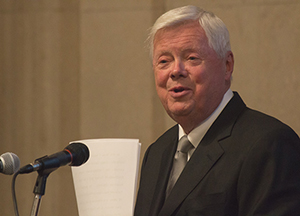Prominent judges, attorneys and legal academics gathered at the Thomas R. Kline Institute of Trial Advocacy on March 6 to celebrate the towering importance of the Pennsylvania Constitution.
The event, co-sponsored by the Pennsylvania Commission on Judicial Independence, focused on the history and ongoing relevance of the commonwealth’s constitution and the importance of a fair and autonomous judiciary.
Calling the Pennsylvania Constitution an “important, robust and unique document, Chief Justice of Pennsylvania Thomas G. Saylor said during opening remarks that it has the power to grant greater rights than the U.S. Constitution.
 Since it was first ratified in 1776, the commonwealth’s constitution has been innovative, Saylor said, noting that it granted all who pay taxes the right to vote, whereas other states only enfranchised property owners.
Since it was first ratified in 1776, the commonwealth’s constitution has been innovative, Saylor said, noting that it granted all who pay taxes the right to vote, whereas other states only enfranchised property owners.
Judge C. Darnell Jones of the U.S. District Court for the Eastern District of Pennsylvania, who moderated the event, called the Pennsylvania Constitution “perhaps the most democratic in America.”
The Pennsylvania Supreme Court has served as a national leader in enabling state courts to rediscover the potency of their respective state constitutions to offer citizens greater protections than the U.S. Constitution, Professor Robert F. Williams of the Rutgers University of School of Law said.
Williams cited the Pennsylvania Supreme Court’s recent decision to overturn a gerrymandered congressional map that tilted electoral power toward the Republican Party.
Professor Seth Kreimer of the University of Pennsylvania Law School presented the findings of a review of the Pennsylvania Supreme Court’s exercise of judicial review over the past decade and found it had voided 28 statutes and 20 criminal procedures as well as 10 administrative actions.
“Every member of the court has penned or joined an opinion,” Kreimer said. “The Pennsylvania Supreme Court engaged in a continuing process of judicial statesmanship.”
While the U.S. Supreme Court has allowed the states to confer additional rights to their citizens, power in numerous matters has historically seesawed between state and federal government, said Paul Finkelman, the president of Gratz College and author of the forthcoming book, “Supreme Injustice: Slavery in the Nation’s Highest Court.”
Finkelman cited examples such as Pennsylvania’s 1826 passage of a law that protected the liberty of free blacks some 30 years after the U.S. Congress passed the Fugitive Slave Act. By the time Congress passed laws concerning child labor, Finkelman noted, Pennsylvania had already done so.
When the U.S. Supreme Court affirmed the constitutionality of marriage equality, he said, it was merely catching up with the states.
“The states truly are the innovators,” he said.
The Pennsylvania Commission on Judicial Independence, which was created by the Pennsylvania Supreme Court in 2005, is the only one of its kind and aims to educate citizens abut the role of the judiciary, Judge John E. Jones III of the U.S. District Court for the Middle District of Pennsylvania, who co-chairs the commission.
The event provided a powerful affirmation of the importance of the judiciary, attorneys and legal scholars in maintaining our democracy, Dean Daniel Filler.
“This democracy functions because of everything that all of you do,” Filler said.